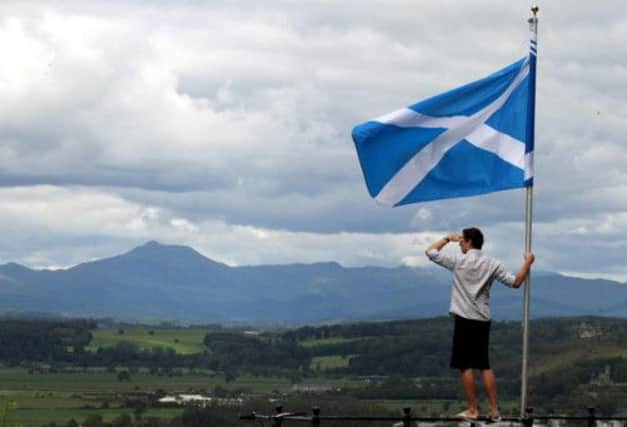Peter Geoghegan: The truth and the other truth


There has been a lot of talk of political neutrality of late – and not just among politicians and mandarins at the United Nations. Sir Jonathan Mills, director of the Edinburgh International Festival, recently said he had no plans to include works centred on the independence debate in next year’s programme, saying: “We would not wish our festival to be anything other than it has always been, which is a politically neutral space for artists.” Questions were raised about whether art can be separated from the social world in which it is created. But few asked whether a “politically neutral space” is actually possible, never mind desirable.
This notion of “political neutrality” infused the Dr Elliott Bulmer stramash, too. Yes Scotland, it emerged recently, paid the academic, who is research director at a body called the Scottish constitutional commission, £100 for writing an opinion piece in a newspaper earlier this summer. Dr Bulmer, many commentators said, had hoodwinked the paying public: here was “a neutral political expert”, as one newspaper called him, accepting money from a political campaign.
Advertisement
Hide AdAdvertisement
Hide AdThe ethics of Bulmer’s decision to take Yes Scotland’s cash are less interesting than the tacit assumptions about neutrality that permeated reactions to the story. Bulmer was an expert and so his pronouncements must, almost by definition, conform to that Holy Grail, “neutrality”.
But the article Bulmer penned was about the potential constitutional benefits of independence for Scotland. This is not a question with a definitive answer; it is an issue alongside which sit a wide spectrum of attitudes. Bulmer’s piece was his opinion. As an expert with research experience in the constitutional arena, his views could be said to hold more weight than that of the average punter, but his opinion is still just that, his opinion.
Too often we conflate expertise and neutrality. Experts are people too, like the rest of us their opinions and viewpoints are suffused with personal experience, attitudes and dispensations. If neutrality presupposes an attitude of unemotional detachment, then experts are practically the least neutral among us – their life and work is tied in with specific topics, ideas and approaches.
This no bad thing. Those with years invested in the study and examination of a subject are well placed to offer informed comment and analysis to the rest of us. But these opinions, often backed up as they are with cogent arguments and relevant facts, should not be confused with something called “the truth”. Before 2008, you would not have struggled to fill a room with economists who solemnly believed that financial markets would never collapse.
Here in Scotland “dispassionate analysis” is often held up as the panacea for an independence debate that has, it’s fair to say, yet to set the heather on fire. “What we need is a neutral debate about the facts” is often wailed when yet another tribal bunfight breaks out between the SNP and Labour, dressed up in the uniforms of the Yes and No campaigns respectively.
Hidden behind this is the idea that if we just lined up all the “dispassionate” facts and arguments about independence the answer to next September’s question could be arrived at by simple arithmetic. But independence is not that sort of question. There is not a yes/no answer, although that is the choice voters will be faced with next September.
Problems of politics and economics, of competing social visions, cannot be “solved” in the same way a problem in mathematics or chemistry can. They cannot be subjected to the falsification that philosopher of science Karl Popper held as the demarcation between scientific endeavour and pseudo-science. It is possible that atomic theory could be demonstrated to be false; it is not possible to show empirically that Scotland would be a happier/fairer/richer/safer country (delete as appropriate) with or without independence.
The relentless emphasis on neutrality, as US social scientist Howard Zinn recognised, obscures the reality that ideas are not asocial, valueless entities. Instead they come from specific attitudes and opinions. “Why should we cherish ‘objectivity’, as if ideas were innocent, as if they don’t serve one interest or another?” wrote Zinn. “Surely, we want to be objective if that means telling the truth as we see it, not concealing information that may be embarrassing to our point of view. But we don’t want to be objective if it means pretending that ideas don’t play a part in the social struggles of our time, that we don’t take sides in those struggles.”
Advertisement
Hide AdAdvertisement
Hide AdThe opposite of neutrality is not bias. Journalists are seldom described as “neutral” but almost all would aspire to reporting that is fair and without prejudice. They achieve this by presenting both sides of the story, by giving voice to different viewpoints, but at the same time weighing up evidence and inferring reasonable conclusions.
Neutrality is a horizon value, a destination that can be approximated via balanced and accurate reporting but can never be completely reached.
Accepting the limits of neutrality does not mean we should ignore experts or facts, or slip into glib post-modernist relativism. Indeed, when it comes to the referendum, acknowledging the partiality of all viewpoints could help free up the debate from two monolithic campaigns offering opposing versions of “the truth” on everything from European membership to currency and passport controls.
Instead of trying to create spaces or experts that are politically neutral, we would do better to recognise that when it comes to questions of politics the best we can aim for is diversity and balance. Anything more is an illusion.